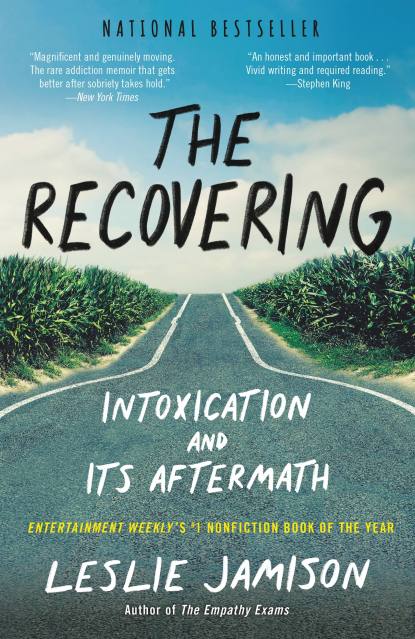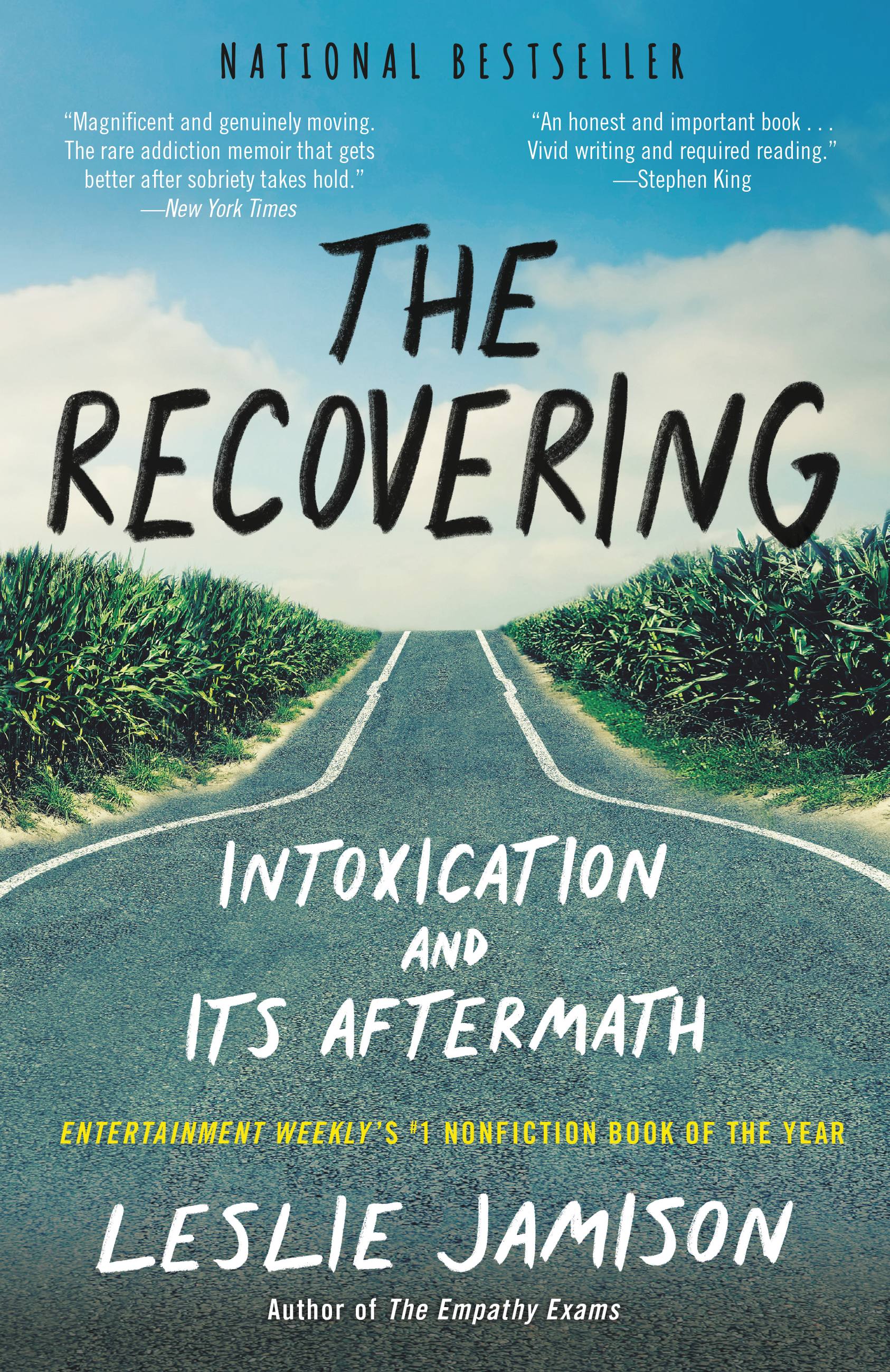By clicking “Accept,” you agree to the use of cookies and similar technologies on your device as set forth in our Cookie Policy and our Privacy Policy. Please note that certain cookies are essential for this website to function properly and do not require user consent to be deployed.
The Recovering
Intoxication and Its Aftermath
Contributors
Formats and Prices
- On Sale
- Apr 3, 2018
- Page Count
- 544 pages
- Publisher
- Little, Brown and Company
- ISBN-13
- 9780316259620
Price
$12.99Price
$16.99 CADFormat
Format:
- ebook $12.99 $16.99 CAD
- Audiobook Download (Unabridged)
- Trade Paperback $21.99 $28.99 CAD
This item is a preorder. Your payment method will be charged immediately, and the product is expected to ship on or around April 3, 2018. This date is subject to change due to shipping delays beyond our control.
Buy from Other Retailers:
From the New York Times bestselling author of The Empathy Exams comes this transformative work showing that sometimes the recovery is more gripping than the addiction.
With its deeply personal and seamless blend of memoir, cultural history, literary criticism, and reportage, The Recovering turns our understanding of the traditional addiction narrative on its head, demonstrating that the story of recovery can be every bit as electrifying as the train wreck itself. Leslie Jamison deftly excavates the stories we tell about addiction — both her own and others’ — and examines what we want these stories to do and what happens when they fail us. All the while, she offers a fascinating look at the larger history of the recovery movement, and at the complicated bearing that race and class have on our understanding of who is criminal and who is ill.
At the heart of the book is Jamison’s ongoing conversation with literary and artistic geniuses whose lives and works were shaped by alcoholism and substance dependence, including John Berryman, Jean Rhys, Billie Holiday, Raymond Carver, Denis Johnson, and David Foster Wallace, as well as brilliant lesser-known figures such as George Cain, lost to obscurity but newly illuminated here. Through its unvarnished relation of Jamison’s own ordeals, The Recovering also becomes a book about a different kind of dependency: the way our desires can make us all, as she puts it, “broken spigots of need.” It’s about the particular loneliness of the human experience-the craving for love that both devours us and shapes who we are.
For her striking language and piercing observations, Jamison has been compared to such iconic writers as Joan Didion and Susan Sontag, yet her utterly singular voice also offers something new. With enormous empathy and wisdom, Jamison has given us nothing less than the story of addiction and recovery in America writ large, a definitive and revelatory account that will resonate for years to come.
-
"An astounding triumph...A recovery memoir like no other...Jamison is a writer of prodigious ambition...Here, she's a bare-it-all memoirist, an astute critic, and a diligent archivist all in one. The book knows no bounds, building in depth and vitality with each passing concern...There's something profound at work here, a truth about how we grow into ourselves that rings achingly wise and burrows painfully deep."David Canfield, Entertainment Weekly (A)
-
"A sprawling, compelling, fiercely ambitious book...Its publication represents the most significant new addition to the canon in more than a decade...Jamison's writing throughout is spectacularly evocative and sensuous...She thinks with elegant precision, cutting through the whiskey-soaked myths...Jamison is interested in something else: the possibility that sobriety can form its own kind of legend, no less electric, and more generative in the end."Sophie Gilbert, The Atlantic
-
"Masterful...beautifully honest...Essential reading...The most comprehensive study of the relationship between writing and alcohol that I have read, or know about...The prose is clean and clear and a pleasure to read, utterly without pretension. Although the subject is dark, Jamison has managed to write an often very funny page turner...In short, The Recovering is terrific, and if you're interested in the relationship between artists and addiction, you must read it."Clancy Martin, Bookforum
-
"Magnificent and genuinely moving. This is that rare addiction memoir that gets better after sobriety takes hold."Dwight Garner, New York Times
-
"A remarkable feat...Jamison is a bracingly smart writer; her sentences wind and snake, at turns breathless and tense...Instead of solving the mystery of why she drank, she does something worthier, digging underneath the big emptiness that lives inside every addict to find something profound."Sam Lansky, Time
-
"Riveting...Jamison orchestrates a multi-voiced, universal song of lack, shame, surrender, uncertain and unsentimental redemption...It is a pleasure and feels like a social duty to report that Jamison's book shines sunlight on these creepy, crepuscular enchantments. Wisdom floods the scene, and genius never flees. Quite on its own terms, The Recovering is a beautifully told example of the considered and self-aware becoming art."Priscilla Gilman, Boston Globe
-
"Such is Jamison's command of metaphor and assonance that she could rivet a reader with a treatise on toast. We perhaps have no writer better on the subject of psychic suffering and its consolations."Gary Greenberg, The New Yorker
-
"Brilliant...We are aware, most fundamentally, of Jamison's urgency. This, of course, is as it should be, for sheis writing to survive...The Recovering leaves us with the sense of a writer intent on holding nothing back."David L. Ulin, Los Angeles Times
-
"Fascinating...energetic, colorful, fun, buzzy, affecting, and spot-on...Emotional, as well as factual, honesty is the sine qua non of a memoir. Yet this kind of deep honesty--the merciless self-examination and exposure that Jamison displays--is increasingly rare."Melanie Thernstrom, New York Times Book Review
-
"Wonderful...wholly original...it shines."Matt McCarthy, USA Today
-
"Thoughtful, fiercely honest, and intimate, The Recovering is a must-read that is Jamison at her best."Jarry Lee, Buzzfeed
-
"Precise and heartfelt...The Recovering is a magnificent achievement."Scott F. Parker, Minneapolis Star-Tribune
-
"Jamison writes about personal experiences in a way that feels universal...Her vulnerability and determination are present on every page."Maris Kreizman, Esquire
-
"Like Mary Karr's Lit or Caroline Knapp's Drinking: A Love Story, Jamison's perceptive and generous-hearted new book is uncompromising on the ugliness of addiction, yet tenderly hopeful that people can heal...Jamison is a writer of exacting grace...Her prose reaches a new register in conveying the rawness of early sobriety...She captures with fullness the feeling of growing up and growing into oneself."Nora Caplan-Bricker, Washington Post
-
"As engaging as it is thoughtful. Jamison proves both an insightful guide to decades of literature by and about addicts, and a self-aware chronicler of her own struggle with alcoholism...In The Recovering, she has written a movingly humble book, filled to the brim with lessons learned the hard way."The Economist
-
"Gritty...Raw...Thought-provoking and distinct...Fascinating in ways you might not expect...The Recovering ventures beyond the cliché and the ordinary to remind us once again of both the fallibility and resiliency of the human condition."Alexis Burling, San Francisco Chronicle
-
"As a reader of this most consuming book, I celebrate Jamison's deep openheartedness, deliberate unselfishness, immaculate, inculcating vision, and her language--oh, her language...For her intelligence, her compassion, her capaciousness, her search, her deep reading, her precise language, Jamison must be honored here."Beth Kephart, Chicago Tribune
-
"Poignant...Taut and immediate."Sophia Nguyen, Village Voice
-
"A latter-day Susan Sontag...the author of the genre-changing collection The Empathy Exams takes her blend of the personal, reportorial, and scholarly to expansive new lengths and depths...it's the uniqueness of her case studies, as well as the power of addiction as metaphor, that really make it stand out."Boris Kachka, New York
-
"A beautiful behemoth."Jaime Green, GQ
-
"The breadth of Jamison's knowledge on this subject is impressive . . . The writing is beautiful. There are descriptive phrases that are simply breathtaking . . . I couldn't put the book down . . . More than that, I was genuinely moved by how accurately Jamison captures the experience of addiction, the hollows we all try to fill with one thing or another."Roxane Gay, New York Times bestselling author of Bad Feminist
-
"The Recovering follows the story of Jamison's alcoholism in lush, almost caressing detail...For the most part, Jamison's story was the only one I cared about, not because her drunkalog, as she calls it, is different from or better than anyone else's, but because she was so fully there, in her own thronged and fraught mind, illuminating it from the inside. She worries that that kind of interiority suggests a fatal selfishness. But the promise of books is that we are bound up and implicated in other people's lives, even if they have nothing to do with us. Her story is ours now--what a gift."Annalisa Quinn, NPR
-
"The Recovering is a typically adroit offering from Leslie Jamison, who has been deservedly compared to Joan Didion. The work and lives of Jean Rhys, John Berryman, William Burroughs, Marguerite Duras, and many others are featured in fascinating detail, but the thread drawing them all together is that it is told from the perspective of a former alcoholic. Now recovered, Jamison dissects the fetishization of 'whiskey and ink': the romanticization of the 'old, mythic drunks' such as Ernest Hemingway and William Faulkner . . . The book is a compelling work made possible by Jamison's formidable knowledge . . . but the real subject of The Recovering, its driving force, is Jamison herself. This is a memoir of alcoholism deftly mediated through the lives of others, where trauma and abjection (and, equally, seduction) are patched together with collective experience to produce a nuanced, tender portrait of life with and after alcohol."Lucy Watson, Prospect
-
"With intricate detail and multilayered storytelling, The Recovering lays bare the myths surrounding artists and addiction . . . Jamison's exploration of how culture impacts the direction that addiction takes people is, while not new, framed in a nuanced context, giving new breath and voice to an old problem . . . This book reads like a fine poem. Encompassing depth adorned with eloquence and a marriage of memoir and research, the message is important and should serve to shatter our romanticism of the altered artist's contributions. Jamison digs deeply into the mythical cloud billowing around writers and what's in their glass, proving sobriety is a creative force to be lauded."Christina Ledbetter, Associated Press
-
"The book offers a pleasing corrective to the ideal of the drunken seer-poet, swilling gin in the hope that it might bring them one woozy step closer to the tragedy and poetry of life. It also proceeds with accessible lyricism and disarming frankness, a style that serves as an extension of the book's message that sobriety hardly means the end of poetry, of the clarifying intoxification of language."Ted Scheinman, Pacific Standard
-
"Leslie Jamison's forthcoming 544-page door-stopper, The Recovering, promises the same blend of memoir, reportage, and cultural history as her excellent 2014 collection of essays, The Empathy Exams. In The Recovering, Jamison details the ups and downs of her own struggles with alcohol. Looking to famous alcoholic writers, Jamison additionally battles her fear of the boredom of sobriety, describing it with arresting, brutal honesty. This is so much more than an "addiction memoir" -- it is the work of a singular voice at the top of her game."Jeva Lange, The Week
-
"Breaks the addiction-lit mold."Sloane Crosley, Vanity Fair
-
"Symphonic...Beautiful and moving...Jamison writes with poignancy and compassion of hard-won triumphs, hers and others'. She is honest and observant, at times lyrical, about her experiences in AA, what the group gives its members, but also what they lose when they get sober. She writes about the sense of of fellowship in meetings viscerally, like a churchgoer describing a powerful service...The Recovering is an exhaustive and definitive Big Book."Kate Christensen, Wall Street Journal
-
"Jamison is preternaturally canny . . . She provides unexpected perceptions and expertly distilled research . . . The Recovering bursts with insight on how we scramble together our identities, told in a voice that manages by some literary legerdemain to be both winsomely idiosyncratic and resoundingly collective . . . The book is a story of the long, painful, resistant, and unoriginal road to getting--and staying--sober as much as it is a narrative of addiction. But it also conveys the 'sinuous, glimmering energy of recovery.' . . . Along the way, it mutates from one gifted and successful young woman's tale into a larger inquiry into how we seek to heal ourselves . . . Part confession, part literary criticism, part cultural analysis, part musing, and part hard-edged reporting, The Recovering creates its own grainy context, defying all the usual tropes of addiction memoirs . . . Jamison has written an extraordinary document of self-reckoning that will make you think and rethink the trajectory of your own life in its 'mundane realities' as well as its 'cinematic epic mode.' This is a book about one of us, all of us, and the yearnings that take us to dark as well as light-filled places."Daphne Merkin, The New Republic
-
"The Recovering is full to the brim with beauty. Billie Holiday, Amy Winehouse, and David Foster Wallace: The skill and admiration with which she illuminates these complicated lives shows how Jamison herself is touched by the same brand of genius, for better or for worse."Rachel Veroff, Guernica
-
"Jamison is one of the most insightful, introspective, and compassionate authors I have ever encountered, and all of those qualities make her writing about love as sage, biting, and incisive as her writing on addiction...The Recovering proved the secret superpower of memoir as a genre: that someone's darkest secrets and most shameful, hidden thoughts and insecurities can be exactly the thing that someone else needs to read."Cristina Arreola, Bustle
-
"Thrilling...Dynamic...Jamison has proven herself to be both a fierce intellectual and an extreme empath...She's written a singular, extraordinarily insightful memoir of addiction, one which she might insist is altogether ordinary. That a reader might recognize herself in these pages, familiar as they are, is, of course, part of their power."Laura Adamczyk, AV Club
-
"Using a blend of memoir, investigative reporting, and literary criticism, Jamison deftly tells a new narrative about recovery, the history of recovery, the criminalization of addiction, and more."Liberty Hardy, Book Riot
-
"Stunning... Her language manages somehow to be simultaneously lush and piercing. It is richly imaged, delighting the senses with its descriptive texture."Los Angeles Review of Books
-
The breadth of Jamison's knowledge on this subject is extensive and there beautifully written moments throughout coupled with interesting insights about the sociopolitical implications of addiction and how privilege can shape the experience of addiction. This book is a beautiful mess and well worth reading."Roxane Gay, Omnivoracious
-
"Leslie Jamison, the accomplished scholar and venerated essayist, has written a great book . . . She dazzles us with her feats of scholarship . . . The sheer immensity of the book is noteworthy . . . The Recovering is a magisterial survey of recovery literature and a beautifully written memoir in its own right."Garrett Kamps, Huffington Post
-
"Jamison is a notably lyrical writer, but what really shines is her curious, generous, sensitive mind... It's a rich and powerful chorus."Thrillist
-
"The Recovering opens our eyes...This book should be required reading--simultaneously informative and chilling, it details the devastation of alcoholism as Jamison bares all, her story the tale of many who sit humbly in circles in 12-Step rooms. Readers will wish the best for this brave soul."The Missourian
-
"Leslie Jamison has written an honest and important book. It will be important to recovering alcoholics who wonder if there really is life after booze, and I think it will be important to writers and critics, because she weaves her story of recovery into those of other artists (mostly writers, but also Billie Holiday and Amy Winehouse) who also made the jump from soused to sober. And some who didn't. The most important thematic thread may be its insistence that the talented artist who needs booze or drugs to support his work and withstand his own vision does not, in fact, exist. It's important to debunk what Todd Rundgren called 'the ever popular tortured artist effect.' All in all, vivid writing and required reading."Stephen King
-
"Leslie Jamison writes about the highs of dependency and also about the highs of recovery. Her prose is so sharp and evocative that the reader feels the thrilling trickle of alcohol down the back of the throat, and breathes the struggle for health and freedom. Jamison demonstrates great wit, penetrating intellect, and an enormous heart. This strangely exhilarating book is about recovery, but it is more resonantly a book about desire, consciousness, kindness, self-control, and love--and hence a Tolstoyan study of the human condition."Andrew Solomon, National Book Award-winning author of Far From the Tree and The Noonday Demon
-
"Leslie Jamison has done a magnificent job of rescuing an age-old social problem from the clichés that surround it, and making us see it anew for the cruel assault on the human spirit that it really is."Vivian Gornick, author of Fierce Attachments and The OddWoman and the City
-
"You don't need to be an addict to be enthralled by The Recovering. This book is for anyone interested in a dazzlingly brilliant, uncommonly compassionate, and often hilarious study of human nature. Leslie Jamison's work will definitely make you feel smarter--I'd like to borrow her brain to pick a fight with a couple of people--but The Recovering also reads like a gripping mystery as written by a subversive and deeply passionate philosopher. Her writing is unexpected, profound, and perverse--in short, a thrill to read. Best of all, for a writer so gifted at locating the excruciating commonalities of isolation, Jamison manages this greatest feat of magic: when I read her words, I come away feeling less alone."Mary-Louise Parker, author of New York Times bestseller Dear Mr. You
-
"Leslie Jamison's The Recovering is a definitive investigation of both the romance of intoxication and the possibilities for recovery. Whether interviewing veterans of a communal rehab house, digging through the archives of alcoholic writers, or examining her own motives and thoughts, Jamison shows ways of living alongside contradictions without diminishing their confusion and pain. Graceful, forensic, and intimate, The Recovering sets a new bar in addiction studies. It is a courageous and brilliant example of what nonfiction writing can do."Chris Kraus, author of I Love Dick
-
"The Recovering is beautifully written, brutally honest, formidably intelligent, emotionally powerful, and absolutely fascinating. Leslie Jamison captured my attention in the very first sentence and didn't let it go for a second until--with reluctance--I finished the very last. Addiction literature has just welcomed a new classic."Anne Fadiman, National Book Critics Circle Awardwinner and New York Times bestselling author of The Spirit CatchesYou and You Fall Down
-
The crawl back up to sobriety is as engrossing as the downward spiral in this unsparing and luminous autobiographical study of alcoholism...The dark humor, evocative prose, and clear-eyed, heartfelt insights Jamison deploys here only underscore her reputation as a writer of fearsome talent.Publishers Weekly (starred review)
-
"Jamison's questing immersion in intoxication and sobriety is exceptional in its vivid, courageous, hypnotic telling; brilliant in its subtlety of perception, interpretation, and compassion; and capacious in its scholarship, scale, concern, and mission."Booklist
-
"Deeply honest...At the heart of this poignant work is an insightful exploration of the loneliness and pain that fuels addiction."Bookpage
-
"Throughout Jamison's somber yet earnestly revelatory narrative, she remains cogent and true to her dual commitment to sobriety and to author a unique memoir "that was honest about the grit and bliss and tedium of learning to live this way--in chorus, without the numbing privacy of getting drunk." The bracing, unflinching, and beautifully resonant history of a writer's addiction and hard-won reclamation."Kirkus
-
"A staggering investigation into cultural assumptions about addicts, and a necessary critique of a literary scene that idolizes the drunken genius. . . . In her essay collection, The Empathy Exams, Jamison more than proved herself as an incisive witness to the complicated, messy lives people lead. Her blend of reportage and personal insight, in the tradition of Joan Didion, is on full display here. . . . Empathetic and unflinching, The Recovering offers a refreshing antidote to narratives that would marry substance abuse to creativity."Dave Wheeler, Shelf Awareness
-
"The sheer immensity of the book is noteworthy . . . The Recovering is a magisterial survey of recovery literature and a beautifully written memoir in its own right."Garrett Kamps, HuffPost
-
"Clever, bold, and earnest . . . The Recovering makes for bracing reading . . . Jamison writes wonderfully well about the bad old days, beginning with the very early drinking when she felt 'giddy from a sense of trespass.' . . . The Recovering is an impressive work: difficult, strong, and strange, both comprehensive and impressionistic, with much to say about how we live, how we yearn, and how we might do both differently."Susie Boyt, The Spectator (UK)
Newsletter Signup
By clicking ‘Sign Up,’ I acknowledge that I have read and agree to Hachette Book Group’s Privacy Policy and Terms of Use







